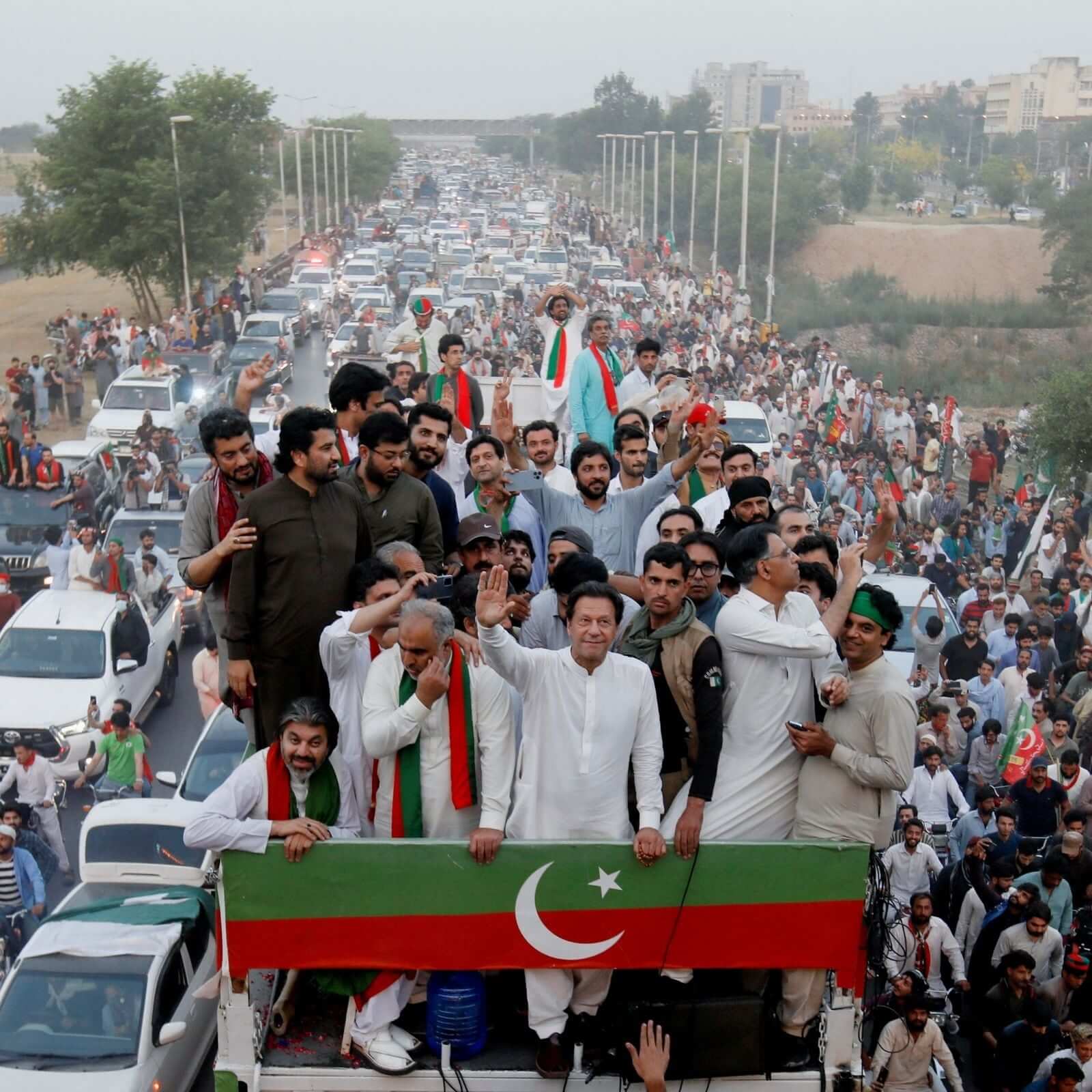The Islamabad Police filed two separate cases against several Pakistan Tehreek-e-Insaaf (PTI) leaders, including former Prime Minister (PM) Imran Khan, for instigating arson and violence during the Azadi March in the capital on Wednesday.
Cases have been lodged against 150 people, of which 39 have already been arrested. They have been accused of burning bus stations at Islamabad’s Jinnah Avenue, attacking a government vehicle at the Express Chowk, and breaking the windows of media organisations Geo News and Jang.
In addition, Interior Minister Rana Sanaullah has vowed to take action against Khyber Pakhtunkhwa (KP) Chief Minister (CM) Mahmood Khan over his participation in the Azadi March, which he described as an “attack on the federation.” To this end, the government has filed charges against provincial police officers and government employees that assisted the PTI.
SC allowed the PTI to hold its Azadi March protest near Peshawar Mor after “PTI assured that its workers would not cause damage to public and private properties”https://t.co/eOJuo1PabR https://t.co/IkZhddY9wz
— Reema Omer (@reema_omer) May 25, 2022
Addressing the National Assembly (NA), PM Shehbaz Sharif criticised the KP CM for supporting the march, questioning “Has a province ever led an attack on the Centre? A province’s chief minister helped attack the Centre.”
The law and order situation in Islamabad took a turn for the worse on Wednesday after former PM and PTI leader Imran Khan-led the Azadi March to enter D- Chowk. Khan had vowed to continue to sit-in at D-Chowk along with his supporters until the government announced fresh elections, but has now left the protest site after concerns about clashes between PTI supporters and the Army. He has vowed to return in six days if the Sharif government does not meet his demands for fresh elections, promising to bring “the entire nation” with him.
“I had decided that I will sit here until the government dissolves assemblies and announces elections, but of what I have seen in the past 24 hours, [the authorties] are taking the nation towards anarchy,” Khan said as he left D-Chowk.
We have entered Punjab and will InshAllah be heading towards Islamabad.
— Imran Khan (@ImranKhanPTI) May 25, 2022
No amount of state oppression and fascism by this imported govt can stop or deter our march.#حقیقی_آزادی_مارچ pic.twitter.com/NMRNRU2F3G
The former PM accused the government of using the sit-in to instigate clashes between the people and the army. Khan highlighted that five PTI members had already been killed during clashes due to clashes with security forces.
Protests were also held in Karachi, Lahore, and Quetta, among other cities. Virtually each of the protests turned violent, with protesters clashing with security forces.
We have been glued to our screens for 24 hours straight. Felt the terror of the fascists, mourned loss of 5 lives, applauded bravery of marchers who stayed despite shelling & tear gas attacks, but most celebrated thing was breaking barriers to get to D Chowk; we defeated them!
— PTI (@PTIofficial) May 26, 2022
Keeping this in mind, Khan made a plea for “justice for the people of Pakistan from the Supreme Court judges and the lawyers’ community.”
However, responding to Khan’s six-day ultimatum, PM Shehbaz Sharif said that the decision on the date of the next elections would be made by the National Assembly and that his government “refuses to be dictated [to].”
He asserted, “If you think you will pressurize, blackmail or threaten us to leave the government, keep in mind, do it in your own house, not this House.”
Sharif added that there are 14 months till the end of the government’s term but that he is open to dialogue.
It has been my conviction that Pakistan will progress only through sheer hard work. Politics of dharna is detrimental to progress & stability. We are focused on overcoming challenges of governance. Nothing can distract us from the task at hand. I owe it to people of Pakistan 🇵🇰
— Shehbaz Sharif (@CMShehbaz) May 25, 2022
He further accused the PTI of launching violence across the country and denied reports of any negotiations between the government and the PTI. Instead, he vowed to work on stabilising the economy and to “fight for Pakistan’s progress.”
Khan’s decision to approach D-Chowk violated the Supreme Court’s directions to restrict the sit-in to the H9 and G9 areas of Islamabad. As protestors approached D-Chowk, the government deployed the Army to protect the city’s red zone, which houses several sensitive buildings, including the Parliament and Supreme Court. Dawn reported that protestors entered the Red Zone and departed only after negotiations with the police.
The incumbent government, too, defied the Supreme Court’s orders to refrain from arresting and using undue force against protestors. PTI leader Shireen Mazari, for example, claimed that the police were using “expired” tear gas against women and children.
Just received a message of @ShireenMazari1 she faced expired tear gas fourth time today along with many other women and children. She said “Use of expired tear gas is not only violation of court orders but it’s a terrorism against Pakistani citizens by Rana Sanaullah”.
— Hamid Mir (@HamidMirPAK) May 25, 2022
Taking all of this into consideration, Supreme Court Chief Justice Umar Atta Bandial said that May 25’s events had shaken the court’s confidence in the political parties of the country. The Supreme Court said its order to bar the sit-in beyond the designated regions was issued “for the protection of the masses” and their right to protest. In this respect, the Chief Justice noted, “Only PTI’s leadership could have controlled the situation.”
However, the judges refused to admit the government’s petition to file contempt of court charges against Khan for violating the court’s orders. The court said that the decision was made pursuant to the PTI’s “categorical assurance” that subsequent rallies “would not cause any inconvenience” and would be conducted in a “peaceful and lawful manner.”

